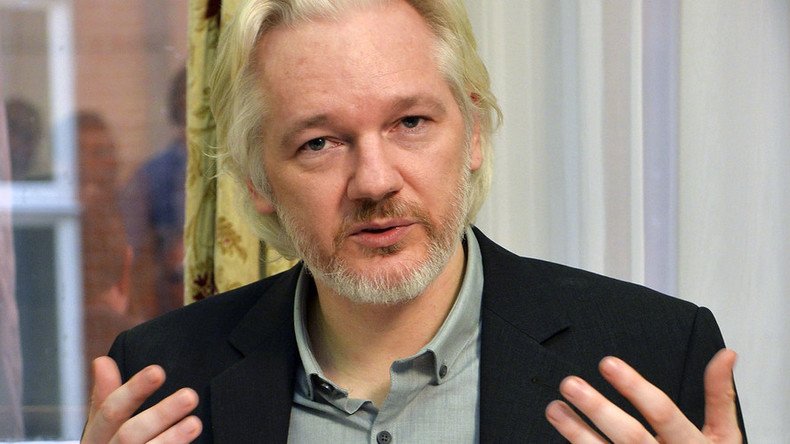UN panel rules Julian Assange arbitrarily detained, entitled to liberty & compensation

A UN panel has ruled that WikiLeaks founder Julian Assange has been ‘arbitrarily detained’ in the Ecuadorian embassy in London, calling upon the UK and Sweden to end Assange’s deprivation of liberty.
"The Working Group on Arbitrary Detention (WGAD) … considered that Mr. Julian Assange was arbitrarily detained by the Governments of Sweden and the United Kingdom of Great Britain and Northern Ireland,” the statement said.
The group concluded that the WikiLeaks founder “is entitled to his freedom of movement and to compensation.”
“The Working Group considered that Mr. Assange has been subjected to different forms of deprivation of liberty: initial detention in Wandsworth Prison [in London] which was followed by house arrest and his confinement at the Ecuadorian embassy.”
UN announces that Julian Assange is unlawfully detained https://t.co/C5moqbA9an
— WikiLeaks (@wikileaks) February 5, 2016
More: https://t.co/Mb6gXlz7QSpic.twitter.com/iKWnyUS8LB
Wikileaks founder Julian Assange has been arbitrarily detained by Sweden and the United Kingdom since his arrest in...
Posted by United Nations Human Rights on Friday, February 5, 2016
The panel said that it ruled that Assange’s detention “was arbitrary” as he was “held in isolation during the first stage of detention.” Also that “the lack of diligence" by the Swedish Prosecutor in its investigations resulted in the “lengthy detention of Mr. Assange.”
Timelapse of Julian Assange
Posted by RT Play on Thursday, February 4, 2016
The UN panel also called upon UK and Swedish authorities “to assess the situation” of the WikiLeaks founder and “ensure his safety and physical integrity” and to “facilitate the exercise of his right to freedom of movement in an expedient manner.”
“The Working Group also considered that the detention should be brought to an end,” the experts concluded.
#Assange detention case: Clarifications on whether the #UNWGAD opinion to be issued tomorrow is legally binding pic.twitter.com/BGUJEzoJn3
— UN Human Rights (@UNHumanRights) February 4, 2016
UK authorities, however, rejected the UN panel’s ruling on Assange, saying that they are legally obligated to extradite him to Sweden.
"This changes nothing. We completely reject any claim that Julian Assange is a victim of arbitrary detention. The UK has already made clear to the UN that we will formally contest the working group's opinion," a government spokesman said.
According to the spokesman, Assange "is, in fact, voluntarily avoiding lawful arrest by choosing to remain in the Ecuadorian embassy.”
Julian Assange detention - by the numbers pic.twitter.com/v4sdSNqnXv
— WikiLeaks (@wikileaks) February 5, 2016
The Swedish government said that any decision regarding the preliminary investigation, for example regarding detention in absentia, is taken by independent judicial authorities.
Reporters Without Borders (RSF) said the organization was “extremely pleased” by the UN panel decision and urged Britain and Sweden to “heed this very clear message.”
“In the absence of guarantees, the possibility that the founder of WikiLeaks could be sent against his will to face criminal charges in the United States in connection with the leaks posted on the website is not only not negligible but in fact poses a major threat both to himself and, more broadly, to freedom of information,” RSF secretary-general Christophe Deloire said.
Heavy media presence at the Ecuadorian Embassy here in London. No police... Yet! pic.twitter.com/GQ6QXtJust
— Andrew J McNair (@andrew_mcnair) February 5, 2016
The WikiLeaks founder filed a complaint against Sweden and Britain to the UN Working Group on Arbitrary Detention back in September 2014.
In Sweden, Assange is wanted for questioning regarding allegations of sexual assault against two women in 2010, which he has always denied. The WikiLeaks founder says that he fears that if he goes to Sweden he will have to face a tribunal in the US for publishing classified documents. Stockholm, however, has refused to guarantee that this would not happen.
Inconvenient Wikileaks secretsWhy Washington mad at Assange
Posted by RT Play on Friday, February 5, 2016
#Assange sex case: 5 things you may not know about it https://t.co/FqKPmmuw2Epic.twitter.com/UkQ6eXzuZH
— RT (@RT_com) February 5, 2016
In August, Swedish prosecutors said they would drop the investigation into two allegations of sexual molestation and one of unlawful coercion as the statute of limitations had run out. One outstanding allegation of rape remains, about which Assange is still to be questioned.
On Thursday, an official from OHCHR (Office of the United Nations High Commissioner) Christophe Peschoux said if the UN panel concludes that a person's rights have been violated then "the decision is indirectly, but still legally binding on the relevant authorities and states."
#Wikileaks spokesman: UK, Sweden should respect UN panel ruling on #Assangehttps://t.co/Fj8uRtVQOLpic.twitter.com/7bOOfLlmNZ
— RT (@RT_com) February 5, 2016
The opinions of the Working Group on Arbitrary Detention are legally-binding to the extent that they are based on international human rights law, such as the International Covenant on Civil and Political Rights (ICCPR). The binding nature of its opinions derives from the collaboration by states in the procedure, the adversarial nature of is findings and also by the authority given to the WGAD by the UN Human Rights Council.












